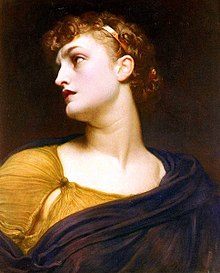
Back أنتيجون Arabic Antigone BAR Антыгона Byelorussian Антигона Bulgarian আন্তিগোনে Bengali/Bangla Antigone (merc'h Oidipoüs) Breton Antigona (mitologija) BS Antígona (filla d'Èdip) Catalan Antigona Czech Antigone Welsh
| Antigone | |
|---|---|
 Antigone by Frederic Leighton, 1882. | |
| Abode | Thebes, Ancient Greece |
| Personal information | |
| Parents | Oedipus Jocasta or Euryganeia |
| Siblings | Ismene Eteocles Polynices Oedipus |
In Greek mythology, Antigone (/ænˈtɪɡəni/ ann-TIG-ə-nee; Ancient Greek: Ἀντιγόνη, romanized: Antigónē) is a Theban princess and a character in several ancient Greek tragedies. She is the daughter of Oedipus, king of Thebes; her mother is either Jocasta or, in another variation of the myth, Euryganeia. She is a sister of Polynices, Eteocles, and Ismene.[1] The meaning of the name is, as in the case of the masculine equivalent Antigonus, "in place of one's parents" or "worthy of one's parents". Antigone appears in the three 5th century BC tragic plays written by Sophocles, known collectively as the three Theban plays, being the protagonist of the eponymous tragedy Antigone. She makes a brief appearance at the end of Aeschylus' Seven against Thebes, while her story was also the subject of Euripides' now lost play with the same name.
- ^ Roman, L., & Roman, M. (2010). Encyclopedia of Greek and Roman mythology., p. 66, at Google Books
© MMXXIII Rich X Search. We shall prevail. All rights reserved. Rich X Search